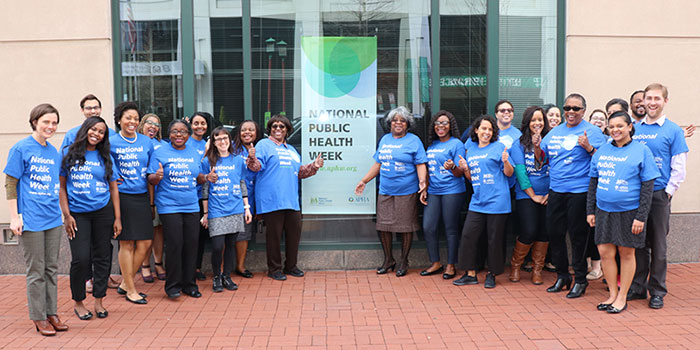Public health practice requires the application of knowledge, skills and abilities to programs, policy and research. Public health groups, associations and organization help to build capacity by offering resources and tools necessary for promoting good public health practice and improving the health of individuals and communities .They provide a networking platform as well as a wide range of resources and learning opportunities in health communications, library services, research, policy and program planning and evaluation.
Here is a list of top 10 public health organization You Should Know:
- Agency for Toxic Substances and Disease Registry(ATSDR): The Agency for Toxic Substances and Disease Registry (ATSDR), based in Atlanta, Georgia, is a federal public health agency of the U.S. Department of Health and Human Services. ATSDR protects communities from harmful health effects related to exposure to natural and man-made hazardous substances. They do this by responding to environmental health emergencies; investigating emerging environmental health threats; conducting research on the health impacts of hazardous waste sites; and building capabilities of and providing actionable guidance to state and local health partners.
- American Public Health Association (APHA) is a Washington, D.C.-based professional organization for public health professionals in the United States. Founded in 1872 by a group of physicians, including Dr. Stephen Smith and Dr. Henry Hartshorne, APHA has more than 25,000 members worldwide.The Association defines itself as an organization that: “APHA champions the health of all people and all communities. We Strengthen the public health profession. We speak out for public health issues and policies backed by science. We are the only organization that combines a 150-plus year perspective, a broad-based member community and the ability to influence federal policy to improve the public’s health.” It defines its mission as: “Improve the health of the public and achieve equity in health status.
- Association of Public Health Laboratories(APHL): This dynamic organization works to boost the strength of laboratories that work in the interest of the public health both in the US and around the world. APHL works to build effective laboratory systems in the US and globally. The association represents state and local governmental health labs that monitor and detect public health threats.
- American Society of Tropical Medicine and Hygiene(ASTMH): The American Society of Tropical Medicine and Hygiene (ASTMH) is a non-profit organization of scientists, clinicians, students and program professionals whose longstanding mission is to promote global health through the prevention and control of infectious and other diseases that disproportionately afflict the global poor. ASTMH members work in areas of research, health care and education that encompass laboratory science, international field studies, clinical care and country-wide programs of disease control. The current organization was formed in 1951 with the amalgamation of the American Society of Tropical Medicine, founded in 1903, and the National Malaria Society, founded in 1941.ASTMH has more than 2,700 members from all regions of the world including North America, South America, Europe, Asia and Africa. Its headquarters are located in Arlington, Virginia. The Society publishes The American Journal of Tropical Medicine and Hygiene, a monthly scientific publication.
- Association of State and Territorial Health Officials(ASTHO): The Association of State and Territorial Health Officials (ASTHO) represents the public health agencies of all 50 states in the United States, the District of Columbia, the five U.S. territories, and the three freely associated states. ASTHO members, the chief health officials in each of these jurisdictions, formulate and influence public health policy and work to protect and promote good health in the populations they serve.
- Association of Schools of Public Health(ASPH): This association is the representative of schools of public health that are accredited by the Council of Education for Public Health (CEPH) They Provide a search engine on finding graduate programs, an overview of careers in public health, and information on employment opportunities. ASPH sponsors SOPHAS (Schools of Public Health Application Service) – the online centralized application service for accredited schools of public health.
- Association of Schools of Public Health in Africa (ASPHA) was established on October 23, 2010 in Nairobi, Kenya with eighteen delegates representing 14 institutions of public health. The association was subsequently registered in Accra (where the secretariat is based), Ghana on November 12, 2010. Their objectives is to Provide a forum for sharing innovative ideas, and adapting scientific knowledge specific to our particular environs to promote health, reduce disease burden and alleviate poverty to help accelerate health development in Africa.
- Caribbean Epidemiology Centre (CAREC): The Caribbean Epidemiology Centre (CAREC) was established in January 1975 succeeding the Trinidad Regional Virus Laboratory (TRVL). The TRVL itself was established in 1952 by the Rockefeller Foundation in partnership with the Trinidad and Tobago Government. TRVL was engaged in much work on insect, tick and mite transmitted viruses, commonly called arboviruses. There was also great focus on yellow fever, and Mayaro and Oropouche viruses, which were new to science at that time, and had been isolated at TRVL. In the latter years work expanded to include respiratory and enteroviruses, such as poliomyelitis. TRVL also provided assistance to the veterinarians in isolating the virus of Newcastle disease in chickens. Non-viral diseases such as Leptospira, Toxoplasma and Trypanosoma were also investigated.
- The Carter Center: The Carter Center is a nongovernmental, not-for-profit organization founded in 1982 by former U.S. President Jimmy Carter. He and his wife Rosalynn Carter partnered with Emory University just after his defeat in the 1980 U.S. Presidential elections. The Carter Center’s goal is to advance human rights and alleviate human suffering, including helping improve the quality of life for people in more than 80 countries. The center has many projects including election monitoring, supporting locally led state-building and democratic institution-building in various countries, mediating conflicts between warring states, and intervening with heads of states on behalf of victims of human rights abuses. It also leads disease eradication efforts, spearheading the campaign to eradicate Guinea worm disease, as well as controlling and treating onchocerciasis, trachoma, lymphatic filariasis, and malaria through awareness campaigns.
- Council of State and Territorial Epidemiologists(CSTE): The Council of State and Territorial Epidemiologists is a non-profit organization originally organized in 1955, founded in 1992, and based in Atlanta, Georgia. CSTE works to advance public health policy and workforce capacity for applied public health epidemiologists in all localities, states, and territories in the United States. CSTE also provides information, education, and developmental support of practicing epidemiologists in a wide range of areas as well as expertise for program and surveillance efforts. CSTE works with the Centers for Disease Control and Prevention, the U.S. Congress, the U.S. Department Health and Human Services, Substance Abuse and Mental Health Services Administration (SAMHSA), and other partners. CSTE is led by an executive board composed of members who lead activities in various subject-specific steering committees.






